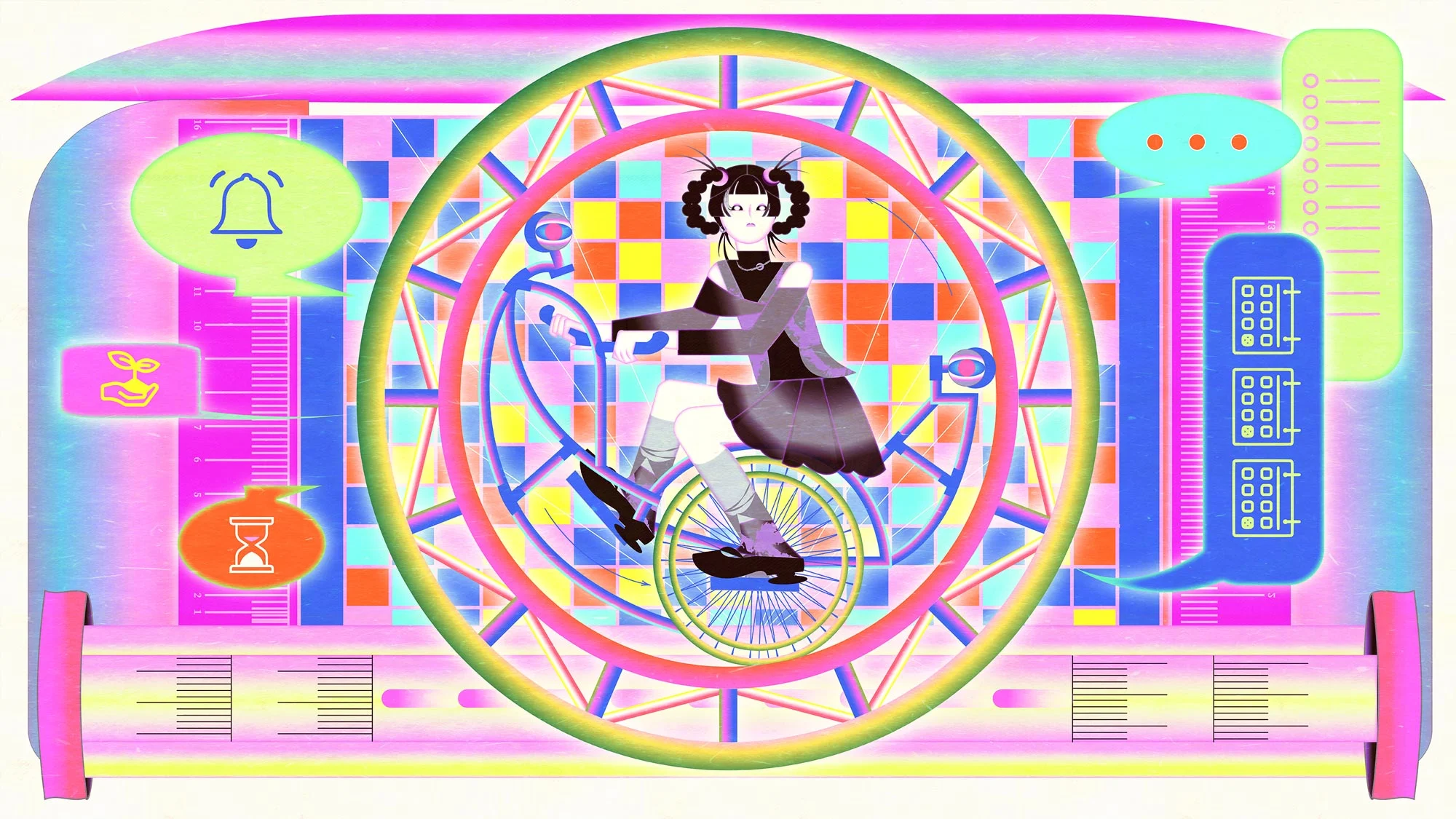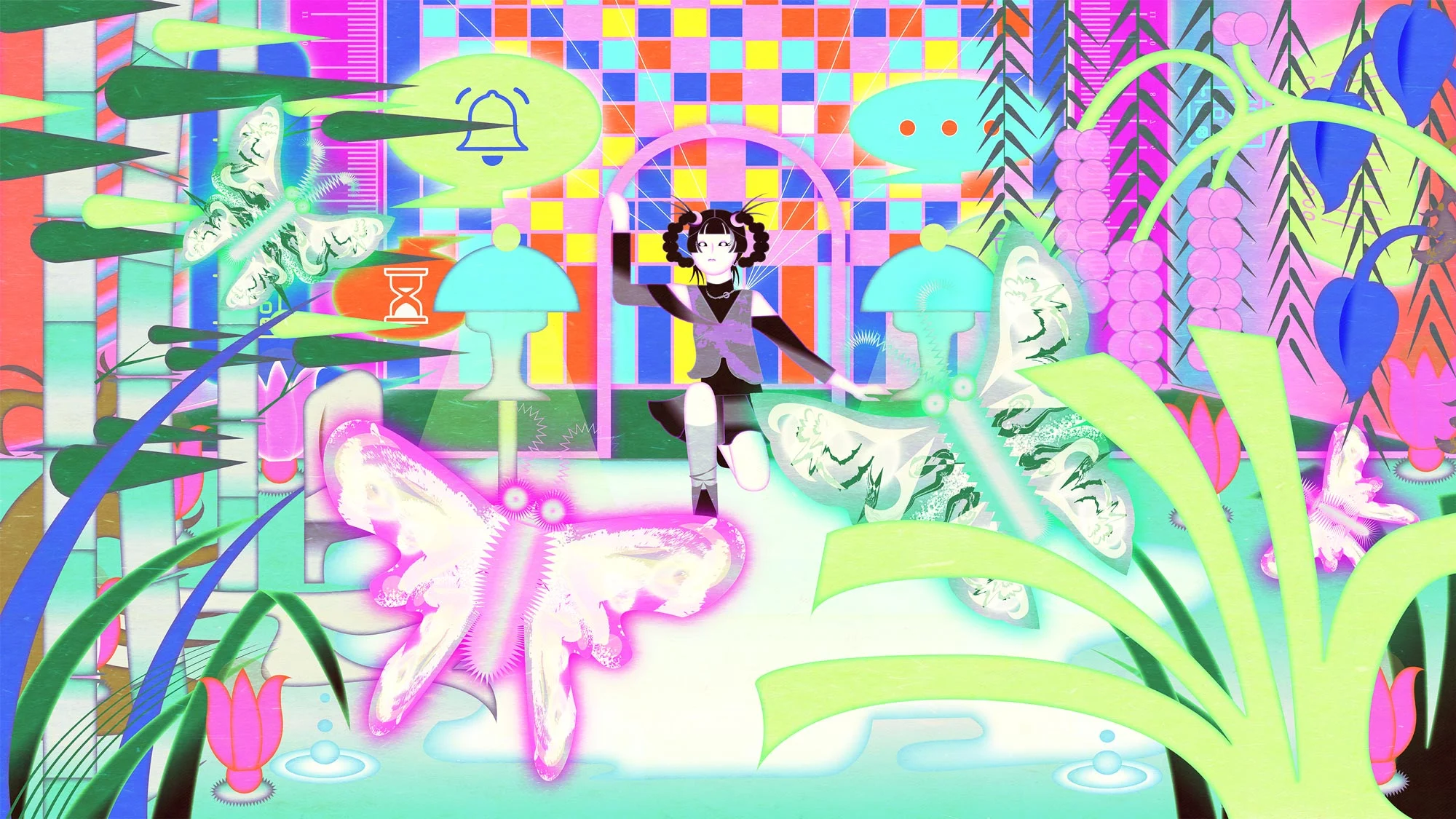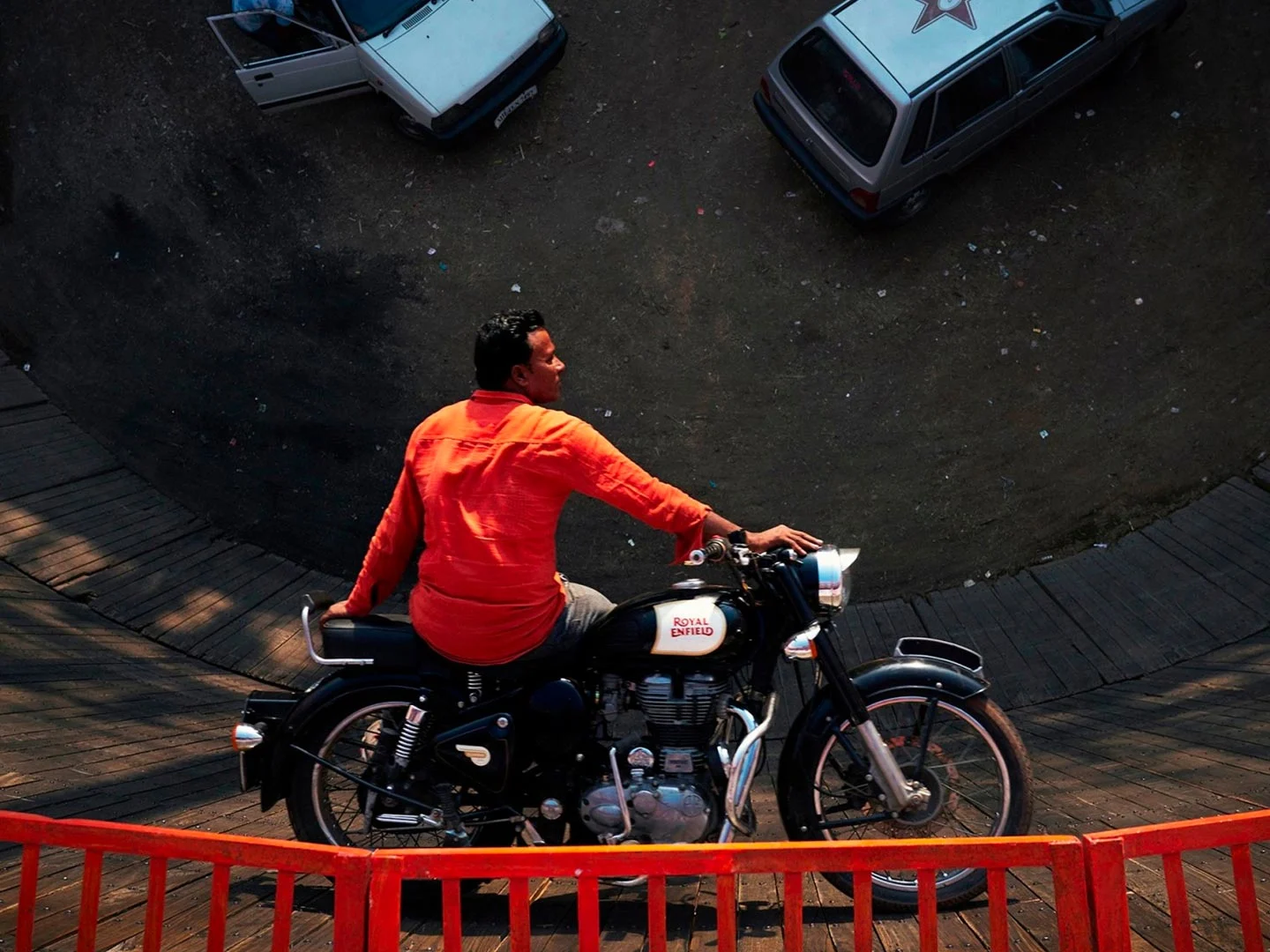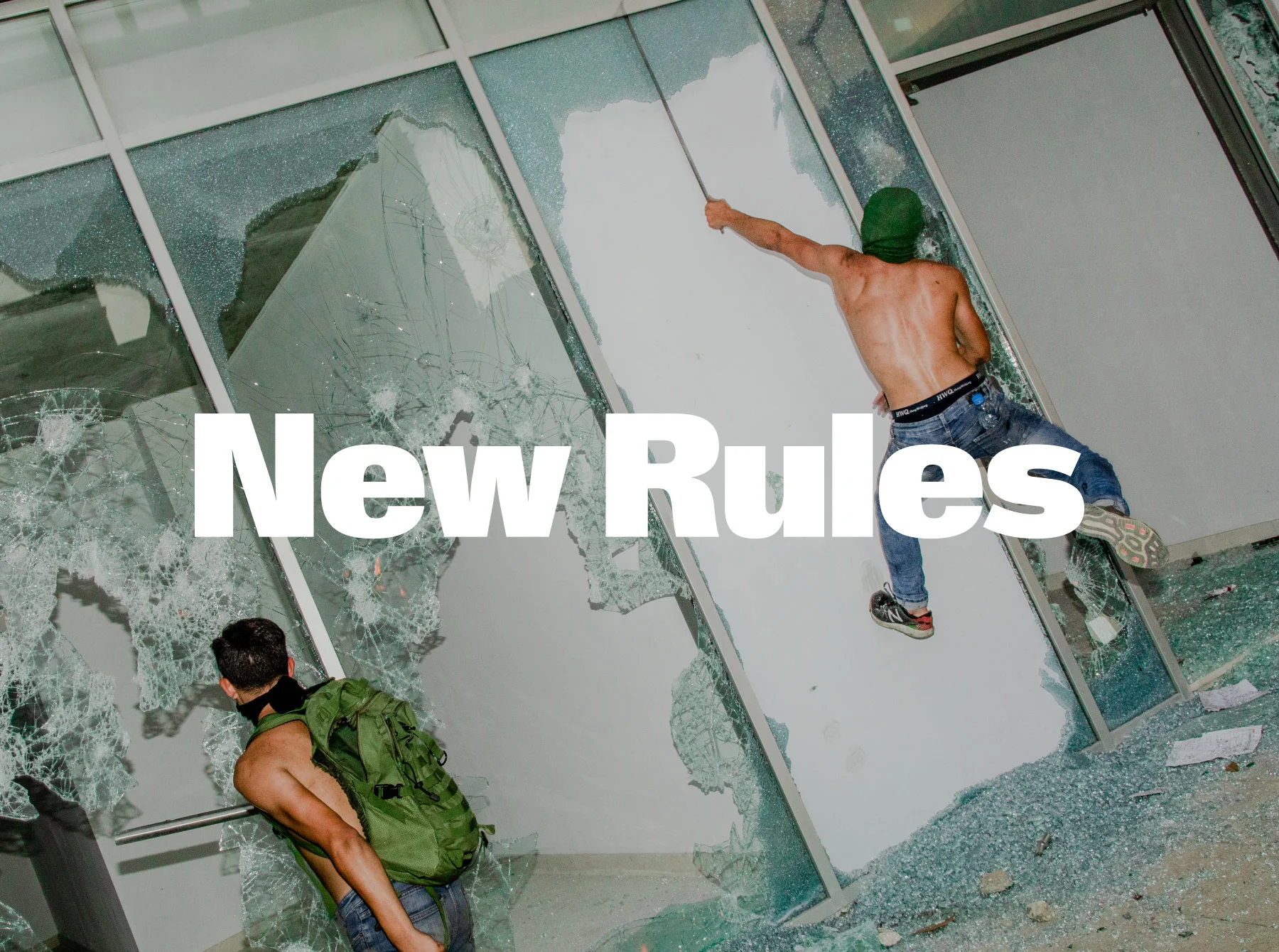

While previous generations have accepted the 9-to-5 as a necessary evil, and even glorified the cult of productivity, Gen Z is quiet quitting, pushing back, and searching for new modes of work that won’t leave them overworked and unfulfilled. Writer Gem Fletcher charts their ongoing pursuit of leisure and liberation, and how it could reshape the working world for everyone.
Visuals by Vanilla Chi.
2015 was peak #GirlBoss era. I was 33, ambitious and eager to make a name for myself in the creative industry. It was a period defined by personal branding, side hustles, and multi-hyphenate careers, and our professional output was our identity. It wasn't enough to be killing it at your job (no matter how shit and menial it was); you also had to launch a zine, make vlogs, write personal essays, or cultivate a second career as a model/DJ/artist/travel blogger. The entrepreneurial energy was intoxicating and all-consuming, insisting that if you just worked hard enough, you too could have it all.
As the internet matured, mastering social media was the key to broadening our horizons. Twitter and Instagram enabled us to platform our side hustles and all the ideas, skills and opinions that were dismissed or unwelcome in the 9-to-5 slog. We turned channels previously designed for holiday snaps and random thoughts into PR machines. We went from being undervalued and dissatisfied in the office to cultivating influence and engagement online. Outliers leveraged their newfound power to circumvent gatekeepers and snag bigger and better IRL positions, paychecks and opportunities. Twenty-somethings began to occupy positions of power, and new types of businesses like Glossier and Discord emerged. It was a moment of unimaginable professional shapeshifting, where anything seemed possible.
Glamourizing burnout
While our professional lives were thriving on paper, our personal lives were non-existent. In attempting to gamify work by blending our passions with our professions, we'd accidentally become the pinnacle of capitalism. We were always on, fiercely competitive, deeply committed to the hustle, and our self-worth was defined by productivity. If that wasn't bad enough, we'd professionalized every aspect of life. Every moment was a PR opportunity—a carefully curated expression of personal branding that rendered life a never-ending performance piece. Unsurprisingly, the cracks of the make-your-own-luck phenomenon eventually began to show. The glamour of being busy was replaced with chronic burnout. We found ourselves caught in a toxic cycle of pressure and stress, unable to step off the hamster wheel of our creation.
The aftershocks of the millennial mindset are still being felt today, alongside the reality of navigating a global pandemic, rising inflation, and a cost of living crisis. However, Gen Z is entering the workforce with a new set of values. They want to challenge capitalism rather than climb the corporate ladder, and seek healthy boundaries between their jobs and personal lives.
People are no longer willing to kill themselves over the pressure of a job.
“People are no longer willing to kill themselves over the pressure of a job,” says Arianne Obi, an account manager at London-based digital strategy studio MØRNING. “Because of Covid, two years of people's youth has been hindered, affecting their ability to explore their interests. Gen Z is questioning work and prioritizing their values.”
Senior creative strategist Shadeh Kavousian adds: “The past few years have been bleak. Gen Z is less precious about their careers, and is looking to prioritize leisure and enjoyment in their free time.”

The messy middle
What the great resignation and the anti-ambition wave all highlight is that, as a society, our relationship with work is changing. Right now, we’re caught in the messy middle. We can identify past errors, but the future is still unclear. We are sitting with the discomfort of adjustment, and quiet quitting is the tonic we need to catch our breath. However, MØRNING senior strategist Emily Chappell thinks a more significant shift is underway.
“Gen Z is really not trying to work,” she says. “They have a real awareness of capitalism and are nihilistic (with a pinch of salt). This has made them question what work is even for. Why contribute to these companies and realities that only cause destruction and mental health problems?”
To avoid being overworked, underpaid and unfulfilled, many young would-be workers are opting out of corporate ladder-climbing and investing their energy online. “There are so many ways to make money,” Chappell says. “Gen Z are choosing ways that make for the most joy—i.e. getting paid to be a creator or make a quick buck on crypto then chill. I think there is almost this ‘suck it up’ factor [with work] that started with boomers, and hummed through generations till now, whereas Gen Zs are like, ‘Nah, I'll do what I want and still thrive, thanks.’”
Seeking liberation
Like millenials before them, GenZ is turning to the creator economy to find this freedom. On platforms like TikTok, Patreon, Substack, Twitch, Instagram, OnlyFans and YouTube, creators can monetize their output and influence through sponsored content, paid subscriptions, merch, events and more. While initially dismissed as a fad, the creator economy comprises over 50 million independent content creators, curators, and community builders, with an estimated value of $100 billion.
For early pioneers, like Norfolk-based creator Brittany Bathgate, the creator economy offered a level of creative autonomy, flexible working and financial independence that her previous retail job could never match. Bathgate never set out to become an influencer when she started sharing personal style images online eight years ago, but she is now one of the UK's leading fashion influencers, with more than 440,000 followers on Instagram, and 6.3 million views on YouTube.
“[When I started], there were no rules!” says Bathgate. “I had all this time to explore photography, creative concepts and my style, but earn money while doing it. I carved out this little corner of the internet for myself. It's mad when I think about it. I was (and still am) working with brands I would never imagine I could work with. I have to be honest: the money was a huge perk of the job, especially when I felt more in the throes of it. Being financially stable in my mid to late 20s felt great.”
Though still in its infancy, the challenging realities of the creator industry are already emerging. A consequence of the success of influencer marketing and the industry's exponential growth is that the creative freedom that initially made the job so appealing is now being jeopardized. Bathgate explains that partnerships now tend to come with “overly rigid briefs full of links, hashtags, KPIs and scripted captions,” rendering them more akin to a traditional agency brief.
I’ve struggled with the ethics and morals surrounding the influencer industry. I’m left feeling like a vessel for brands to sell their products.
“I'm immediately put off because it no longer feels collaborative,” she says. “There's no freedom or creativity in that. Over the past few years, I've struggled with the ethics and morals surrounding the influencer industry and [I'm left] feeling like a vessel for brands to sell their products.”
Over the last few years, we’ve seen creators and users hit a breaking point. Growing reports about influencer burnout and Gen Z’s growing mental health crisis are a potent wake-up call, suggesting the creator economy's utopic emancipation from the 9-to-5 is perhaps not all it cracked up to be.
In an unexpected turn of events, Bathgate is part of a new wave of successful creators cutting back on content partnerships to pursue traditional 9-to-5s. “Working a job that relied on showing my face and consuming social media all the time came at a cost to my mental health and self-esteem,” Bathgate says. “There were a lot of the usual things—comparison, FOMO, burnout—[but I also] started to feel disconnected and lost at points. I almost didn't know myself. I started to question why and what I was creating. Was I creating for an algorithm and popularity, or was I posting because I genuinely liked something?”
Fantasy versus reality
According to Rebecca Jennings, a senior correspondent at Vox who has been reporting on influencers, the creator economy, and social media since 2018, this dysmorphia crisis between an online persona and actual identity is a prevalent issue for content creators.
“I talk to so many famous TikTokers struggling because they don't know the difference between themselves and their internet persona,” Jennings says. “They get stuck feeling like they have to appease this ever-shifting audience and ever-shifting algorithms.”
Though for those working a regular job, pivoting to the creator economy may be a tantalizing prospect, Jennings stresses that participation in that economy isn’t viable for everyone.
It's a privilege to participate in it, as you need to be able to invest in it as a side hustle first,” she says. “While it can free people from corporate indentured servitude—they can live their lives on their own hours, work from home and be their own boss—I often find creators working much longer hours than a regular job. They don't get health insurance. Their income isn't streamlined, and comes from 75 different sources. Most people don't realize that the vast majority of people in the creator economy are not making a living wage. They are making barely anything. This individualized industry prays on people's biggest desires and sells it to them but doesn't take care of the things that people actually need.”
Looking back, it's easy to unpick the inherent failures of the last decade, but despite its issues, it marks the beginning of a new paradigm of professional life. We are slowly untethering ourselves from one idea of success, and prioritizing well-being over productivity and collectivism over individualism. Together, millennials and Gen Z are foregrounding the importance of mental health in the workplace, and doing the messy work of breaking new ground and implementing boundaries.
Will we ever develop a healthier relationship to work? I don’t know. And yet, I'm optimistic that we now have a public discourse around the topic, re-examining our values and imagining how our work lives could be improved.




